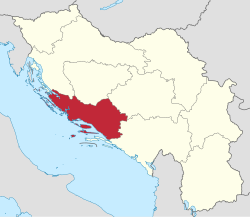Littoral Banovina
| Littoral Banovina Primorska banovina |
|||||
| Banovina of the Kingdom of Yugoslavia | |||||
|
|||||
|
Littoral Banovina (red) within Kingdom of Yugoslavia (light yellow) |
|||||
| Capital | Split | ||||
| History | |||||
| • | Established | 3 October 1929 1929 | |||
| • | Disestablished | 26 August 1939 1939 | |||
| Area | |||||
| • | 1931 | 19,653 km2(7,588 sq mi) | |||
| Population | |||||
| • | 1931 | 901,660 | |||
| Density | 45.9 /km2 (118.8 /sq mi) | ||||
| Today part of |
|
||||
The Littoral Banovina or Littoral Banate (Croatian: Primorska banovina) was a province (banovina) of the Kingdom of Yugoslavia between 1929 and 1939. This province consisted of much of the Croatian region of Dalmatia and parts of present-day Bosnia and Herzegovina and was named for its coastal (maritime) location. The capital city of the Littoral Banovina was Split.
According to the 1931 Constitution of the Kingdom of Yugoslavia,
In 1939, the Littoral Banovina was merged with the Sava Banovina and parts of neighboring provinces to create the Banovina of Croatia.
In 1941, the World War II Axis Powers occupied the former area of the Littoral Banovina. Coastal areas from Split to Zadar were annexed by Fascist Italy with the remainder becoming a part of the Independent State of Croatia. Following World War II, the region was divided between Croatia and Bosnia and Herzegovina within a federal Communist Yugoslavia.
Coordinates: 43°30′00″N 16°26′00″E / 43.5000°N 16.4333°E
...
Wikipedia

